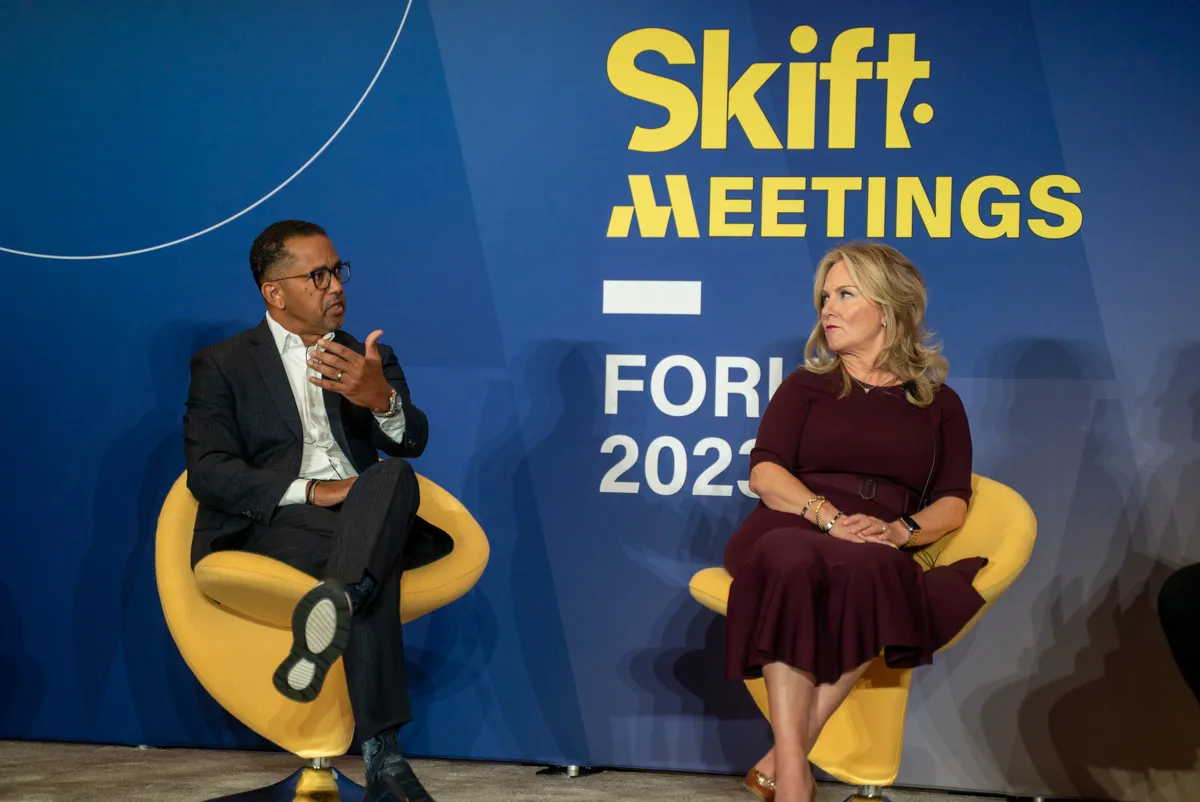Is Sexual Harassment a Problem at Your Conferences?

Skift Take
unfortunately they can sometimes also be havens for sexual harassment. There have been several recent incidents that have made the headlines of harassment at conferences across various industries. As an eventprof, you need to be aware of this problem and how you can eliminate this issue at your events.
According to a poll taken earlier this month, 75% of Americans think sexual harassment in the workplace is a problem in our society. Unfortunately, some of the same misconduct also takes place at conferences and events. When getting ready to attend a conference, you are preparing to meet new people, share ideas, and possibly even land some new business. What you are likely not preparing for is to have to deal with sexual harassment, but even in a professional context, this reality exists. In a recent study, it was found that 60% of the respondents had experienced some form of sexual harassment while attending a conference within the last 24 months. And this isn’t just an issue for females either.
Sexual Harassment in the News
In the past few months, the culture of disparity and sexual harassment within the tech industry has been unveiled involving many highly-regarded figures in Silicon Valley. Among the most publicized have been the transgressions of Robert Scoble, the longtime tech blogger affiliated with firms such as Rackspace, Fast Company, and VR start-up UploadVR - which has also been recently involved in a sexual harassment scandal. It recently came out that Scoble had a long history of sexual misconduct against women, including a detailed account of his inappropriate behavior during Foo Camp, a popular annual tech conference hosted by O'Reilly Media.
The details of Scoble’s history of inappropriate behavior have come out amidst the viral #MeToo movement - a campaign encouraging both women and men to share their experiences of sexual harassment on social media. This campaign was in response to the outrage from the news that movie mogul Harvey Weinstein had been allegedly sexual harassing women in the movie industry for years.
When this type of behavior occurs at conferences, it discourages people from attending, creates a stigma against the event or the entire industry, and victims of sexual harassment can suffer emotional torment that stays with them long after the actual incident, potentially leading to other psychological issues.
Sexual Harassment Does Not Only Affect Females
While females report the majority of sexual harassment complaints, they are not the only ones affected. The 1994 film Disclosure brought the premise of a male as a sexual harassment victim to the silver screen. According to a recent survey done in the U.S., approximately one-third of working men say they have been sexually harassed in the workplace at least once in the past year. The U.S. Equal Employment Opportunity Commission (EEOC) reports that in 2016, roughly 16% of sexual harassment charges were filed by males. As for the U.K., the results of a recent poll showed that nearly 20% of men that participated in the survey had been sexually harassed, but of those affected, only 21% reported it.
There are more than likely many more instances of sexual harassment that take place against men that go unreported. Studies have shown that as much as 71% of women who had experienced sexual harassment did not report it, but that percentage is potentially higher for men. There is no way of knowing for sure, but some of the concerns that men have cited as reasons for not reporting sexual harassment include fear of not being believed, feeling less manly, and having a lack of social support. A 2015 study done in Australia revealed that 5% of reports made by males were based on sexual harassment by females and 11% were by other males. When planning your event, you need to be aware that sexual harassment is an issue that can affect anyone.
What Should Eventprofs Do About It?
As an eventprof, you are ultimately responsible for all that goes on at your event, both good and bad. In order to make sure sexual harassment is not a part of your conference, here are some ways to proactively discourage this type of behavior and make sure it is not welcome.
Establish a Code of Conduct
Whether it is a conference, online discussion board, or workplace, there is a code of conduct for appropriate behavior in all settings. Most people know the general do’s and don'ts of attending a conference or meeting - keep side conversations to a minimum while someone is presenting, take phone calls outside of the meeting room, turn your phone on silent during a presentation, etc. However, rules of conduct in terms of sexual harassment can be a bit more hazy.
In order to make sure everyone is clear on what is deemed as inappropriate behavior, you need to let your attendees know early, and often, what type of conduct is unbecoming at your conference. Your code of conduct also needs to be comprehensive and enforceable so that there is no gray area for interpretation in the case of an incident relating to sexual harassment. Here are the things you need to include to make your event’s code of conduct effective:
1.Make sure the policy is not discriminatory. Women are not the only group that can be victims of sexual harassment.They could be the perpetrators of harassment as well. Also, sexual harassment isn’t always in the form of heterosexual interaction. When crafting your policy, you want to make sure to not discriminate against a particular demographic.
2. List inappropriate behaviors. As we mentioned before, sexual harassment comes in many forms and levels of behavior. In your code of conduct, it is beneficial to list out which acts will not be tolerated at your event.This allows for less interpretation of the policy, and may help stop someone from doing something they may not think is inappropriate, but is not allowed at your event. The EEOC also finds that when ‘acts of harassment’ are specifically defined, the likelihood of reporting incidents more than doubles. With this being said, you might want to include a generic, sweeping statement such as ‘harassment of any kind will not be tolerated’ so that nothing is left up to chance.
3. Punishment for violating the code of conduct. If someone does not adhere to the code, there needs to be severe punishment for making other attendees uncomfortable, and ultimately damaging the reputation of your event. Usually, expulsion from the event without a refund is a pretty stiff punishment, but for more severe cases of harassment, law enforcement may need to get involved.
4. Anonymous method of reporting violations to the code. In addition to having a code of conduct, you need to have a system in place so that people feel they can safely and anonymously report any violations without fear of being shunned. This can include having a confidential conversation with conference staff or submitting a complaint via an electronic form. You may also want to include contact information for venue security, local law enforcement, or hotline specifically geared to reporting incidents of sexual harassment so that people have many options to report a complaint.
5. Educate your event staff on how to proceed should a complaint or situation arise. Your event staff are your eyes and ears, as well as having direct contact with your guests. Prior to your conference, it is important that they are familiar with your code of conduct and proper procedures to follow should a complaint arise. While dealing with sexual harassment at conferences is a bit different from dealing with it in the workplace, you can still follow some of the same best practices for training your staff on how to properly address the situation.
6. Take all reports of sexual harassment seriously. There are varying degrees of sexual harassment and it can come in many forms, and from different perpetrators. No incident is too minor to be addressed in the proper manner. Take care to respond accordingly to each situation.
Once you establish your code of conduct, make it visible as much as possible. Post it on your conference website, mention it on social media, and bring it to everyone’s attention during the event. Repetitive reinforcement will convey to guests that you are serious about your policy and inappropriate behavior will not be tolerated. Here is an example of a comprehensive sexual harassment code of conduct which we invite you to adapt and share for your events.
Monitor Alcohol Consumption
Conferences are events where people get out of their usual routine at the office and interact with colleagues and new acquaintances. Often, conferences will feature some type of networking session or informal gathering where alcohol is served. Alcohol is a staple of networking because it lowers inhibitions and makes everyone more friendly. But we all know that being more friendly can also turn into inappropriate behavior. Alcohol numbs the senses and emboldens people to take action they may not normally do while sober. Let’s be honest - drunk people make bad decisions, sometimes leading to inappropriate behavior and sexual harassment.
While you may not want to totally alleviate alcohol from your event, there are ways to regulate it. Maybe instead of having a full bar you only offer beer and wine? These beverages are much less strong in terms of alcohol content. Or instead of allowing guests to continue to go to the bar freely, you have servers distributing the drinks. Or you could take a step further and stipulate a drink limit per guest or voucher system. Whatever option you choose, it is important to keep an eye out to make sure that guests do not become too inebriated and to be vigilant about inappropriate behavior.
Be Vigilant of Your Attendee List and Ban Sexual Harassment Offenders
It should go without saying that you should be aware of who is attending your event. If someone has had a history of sexual harassment complaints against them or has been known to display inappropriate behavior, do not allow them to come to your conference! This should be true for speakers, entertainment, attendees, media, and so forth. If people have been known to be associated with inappropriate conduct, you do not want them to be associated with your conference and potentially damage its reputation.
If your conference is a recurring event or part of an event series and someone displayed inappropriate behavior in the past, keep track of these complaints. Anyone who is violating your policy should not be allowed to attend future events. Despite Scobles’ inappropriate behavior at the 2010 Foo Camp, he was invited as a presenter at the 2011 Where 2.0 Conference, another event hosted by O’Reilly Media. It also the responsibility of everyone within an industry to denounce known sexual offenders, even if they are not directly affiliated with their organization. In 2016, a male professor that had been found guilty of sexual harassment by his university was still allowed to attend many international scientific conferences, much to the chagrin of his female victims within the industry. Even if the person could be considered a ‘VIP’, you do not want your event to be associated with negativity or make your other guests uncomfortable, so this situation should be avoided altogether by disallowing these people from attending your event.
Encourage Gender Parity
As we mentioned earlier, not all cases of sexual harassment are males harassing females. Sometimes females can be the aggressors as well. Many conferences, especially in industries that are traditionally male-dominant are disproportionately attended by more males than females. Not only are the attendees mostly male, but the speakers, panelists, and other presenters are overwhelmingly male. This environment can create a setting that makes females feel uncomfortable. Conversely, an event with a disproportionate amount of females over males could make the men in attendance feel uncomfortable. By encouraging parity in your event in terms of the people who attend makes for a more-level playing field and an environment where no one feels like they are at a disadvantage for being in the minority.
In Conclusion
As the eventprof, you are responsible for making sure that your guests have the best experience possible. This includes fostering an environment where they feel safe and free from having to deal with inappropriate behavior. Sexual harassment is a serious matter that unfortunately permeates the workplace often and in the context of a conference, can become even worse. It is important to take all precautions in order to make sure that this doesn’t become a problem associated with your event.
Additional Reading on Eliminating Sexual Harassment at Events
Harassment at Meetings May Be a Bigger Problem Than You Thought
The Event Industry’s Problem with Alcohol
How to Ensure Speakers Diversity at Your Conference
3 Ways to Increase Diversity at Events [Video]
The Event Industry’s Problem with Speaker Diversity




